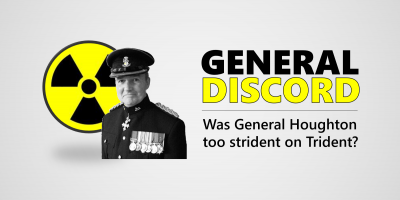Britain’s top soldier picked Remembrance Sunday of all days to declare war on nuclear unilateralism. General Sir Nicholas Houghton, the Chief of the Defence Staff (CDS) and the professional head of the UK’s armed forces, told the Andrew Marr Show that he felt the Labour Leader’s stance on Trident and nuclear weapons undermined the ‘credibility of deterrence’ and it would be a cause for concern if those views were ‘translated into power’. This led Jeremy Corbyn to immediately complain to the Ministry of Defence (MoD) about the General, ‘to ensure that the neutrality of the Armed Forces is upheld’.
As well as demonstrating the clumsiness of the current Labour leadership’s communications management – escalating the war of words only served to keep the story alive for a few more painful days and exposed further divisions within the Labour Party – and the continued fallout from Labour’s schism over Trident, the row does touch on an important issue: the delicate relationship between the military and their political masters in a democracy.
General Houghton’s comments have divided opinion on both sides of British politics. While Labour figures like Shadow Defence Secretary Maria Eagle and former Defence Secretary Lord Hutton have defended the General’s right to comment, Conservative politicians like Crispin Blunt MP, a former cavalry officer who now chairs the influential Foreign Affairs Select Committee, and Dan HannanMEP, have expressed concern.
Pro-Trident Labour MP John Woodcock was quick to accuse his own party leader of hypocrisy: As a backbencher Jeremy Corbyn signed a Commons motion in 2009 welcoming comments by Lord Brammall, a former CDS, questioning the value of Trident.
The MoD has said that it will not be taking any action against the General, perhaps because Queen’s Regulations – the rules which govern the professional and public conduct of members of the Armed Forces – are rather opaque on the issue. Armed forces personnel “are not to take any active part in the affairs of any political organisation, party or movement. They are not to participate in political marches or demonstrations”. This suggests that General Houghton would be wrong to join the Labour Party or go on a Campaign for Nuclear Disarmament march, but does not refer to appearances on Andrew Marr. Others might argue that commenting on a political leader’s policy is involvement in a political organisation.
Such rules are not new. This wording updated an earlier version introduced in 1844 by the Duke of Wellington (who, interestingly, served successively as Commander-in-chief of the Army and then Prime Minister).
But the role of the Chiefs of Staff today is a more complicated one than it was in Wellington’s time. Forces chiefs are not just senior commanders, they are military advisers to the civilian authorities. Both roles require them to lobby ministers to make sure the military has the funding and equipment to perform their role. Unlike other public services, the Armed Forces do not have an official trade union and, just as Queen’s Regulations prevent rank-and-file military personnel from marching against funding cuts, those same regulations are explicit about commanders’ obligations to take care of the welfare of those under their command. This often drags the top brass perilously close to political activity.
General Sir Richard Dannatt, who served as Chief of the General Staff under the previous Labour Government, tested the limits of his role when he campaigned for better pay for soldiers and better treatment of the wounded as well as lobbying for a drawdown of troops in Iraq so the Army could concentrate on operations in Afghanistan. General Dannatt even played an active role in setting up Help for Heroes. Whilst his motivations included concern that the formation of the British Armed Forces Federation (a de facto forces trade union) meant that soldiers were losing confidence in generals to lobby on their behalf, his methods drew significant criticism and, it is rumoured, led to Gordon Brown personally vetoing Dannatt’s appointment as CDS. Dannatt retired and was swiftly appointed as a defence adviser to then Opposition Leader David Cameron and given a peerage. (Perhaps ironically, one of Dannatt’s last acts as head of the Army was to promote Nicholas Houghton to General.)
The Conservative Government should beware in delighting in Labour’s discomfort over the General’s comments. With the Strategic Defence and Security Review just around the corner and the potential escalation of UK military intervention in Syria looming, next time the General may turn his fire on the Government rather than the Opposition.
This latest row offers lessons on consistency for both major parties. Welcoming the comments of Generals when they agree with you makes it that much harder to ignore them when they disagree with you.




